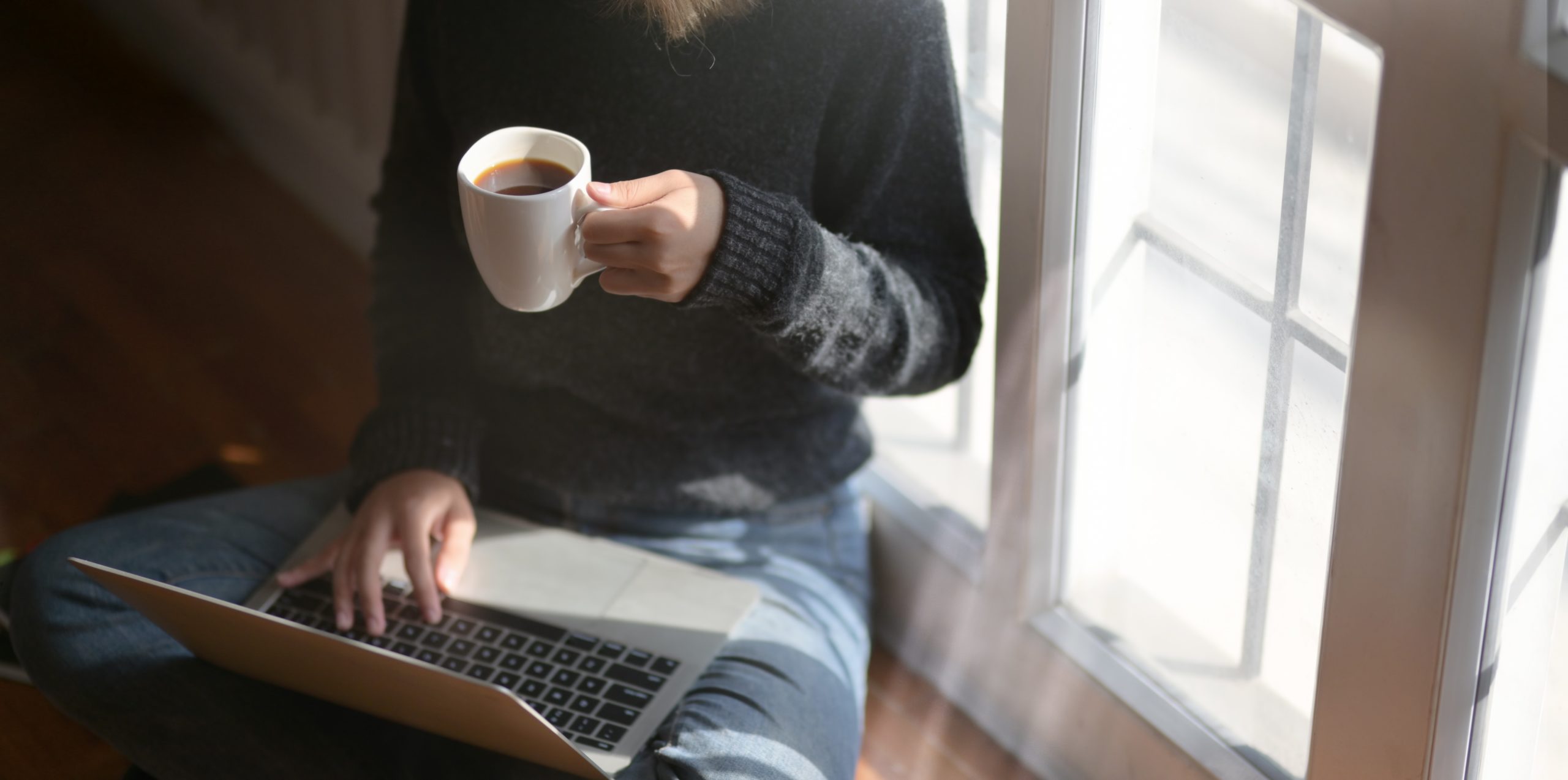Another day working from home, another day wondering when it will end. Many employees have been forced to telecommute due to the pandemic, and while remote work has several benefits, including increased productivity, for some, work-from-home performance is lagging. If that’s you, you’re not alone.
Whether it’s caused by monotony, a lack of energy, or something else, this exhaustion can take a serious bite out of your productivity. So if you’re tired of working from home, let’s go over what might be causing it and what you can do to fix it.
#1 You Miss Social Interaction
Extroverts gain energy from social interaction, while introverts feel drained by it. If you’re an extrovert working from home for extended periods, you’re like a battery missing its charger (other people).
But the truth is, extroverted or not, we all crave social interaction to some extent. It’s part of being human. So if you haven’t had any social interaction lately, that may be why you feel tired of working from home.
Solution: Get creative with how you stay connected to coworkers while working remotely. Mimic social interaction virtually through communication tools like Slack and use apps like Donut to get to know colleagues online. Also, try integrating more phone or video calls into your work life, rather than just emails and chat messages. Lastly, if you can, spend time in-person with loved ones to get your social fix.
#2 You’re Experiencing “Zoom Fatigue”
I know I just recommended video calls in the above paragraph, but too many of them can lead to “Zoom fatigue,” a new term coined during the pandemic. And while video conferencing is the best substitute we have for in-person communication, it’s still just a substitute—and a poor one at that.
Video conferencing, whether via Zoom or another tool, creates a strange reality: Your brain registers the pixels on the screen as being the face of someone you know, but you are also aware that they’re not really present. There’s no possibility of a hug or a handshake. Plus, you have to deal with awkward delays when the video freezes up, something that wouldn’t happen in a real-life convo.

I have yet to find anyone who has captured the incongruity of video chats so eloquently as professor Gianpiero Petriglieri when he tweeted, “It’s easier being in each other’s presence, or in each other’s absence, than in the constant presence of each other’s absence.”
Video conferencing can lead to negative perceptions, too. In one study involving audio calls, a delay of as little as 1.2 seconds was enough to make listeners rate the speaker as being less attentive.
Can video chats at least help fill your need for social interaction? Research is mixed. Though I found at least one small study suggesting that video calls were beneficial for its elderly participants, a recent review of three studies involving 201 older adults concludes that the evidence to support the claim that video conferencing reduces loneliness is “very uncertain.”
Solution: Instead of a video call, it might be better to do a phone call or audio conferencing. It removes the awkwardness that ensues when someone’s face freezes on the screen. It’s also less likely to involve long delays caused by buffering video. But if you’re out of mental capacity to process everything involved with video calls, see if you can just make that meeting an email instead.
#3 You Lack a Routine, or Your Routine Is Boring
Variety is the spice of life, as they say. The richness and complexity of office life are woefully absent at home, especially if you live alone; there just aren’t enough variables to create variety.
People seem to be of two minds when it comes to routine during this pandemic: For me, I believe having a rigid routine keeps me sane and provides me with a sense of comfort. For others, though, routine is maddening; they miss the excitement of the unexpected.
On the one hand, having a routine can reduce stress because you know pretty much what to expect each day. That’s less cognitively demanding. On the other hand, though, routines can become monotonous, leading to boredom, which can lead to tiredness.
In a study published in Nature Communications, researchers discovered that the same region of your brain that controls sleep also controls motivation. So when there’s a lack of the latter (i.e., when you’re bored), you’ll want to fall asleep.
Solution: If you feel tired of working from home, examine which camp you fall into: routine or variety. If you long for routine, try creating and sticking to a work from home schedule. If you crave variety, try changing up your routine. What motivates you? Is it running? Painting? Reading a good detective novel? Do more of that, and you should start to feel more energized.
#4 You’re More Sedentary Than Usual
Employees often complain of how much sitting they do in the office, but the truth is, physically going into work is often more active than working from home. Think of all the little steps that add up: Walking to your car or public transit, getting up to chat with a colleague, joining coworkers for lunch at a nearby cafe. And for some, there are even gyms or exercise programs offered at work.

But when you’re working from home, the commute to any place inside your house is probably pretty short. Plus, with no coworkers around, it can be easy to forget to get up and take a break.
Solution: Schedule movement into your day. If you have an Apple Watch or Fitbit, these devices can remind you when you’ve been sitting for too long and it’s time to move. Additionally, if you can rig up a standing desk, that can help reduce your sitting time.
#5 The Boundaries Between Work and Personal Life Are Blurred
If you’re used to working from an office and are now having to work from home, the collision of work and personal life can be disorienting. You’re used to having physical cues and boundaries that signal it’s time to work. And when you leave the office, your brain knows that work is over.
But when your “office” is now the kitchen table where you eat dinner with your family, that lack of physical separation between work and personal life means your brain never feels like it’s off the clock.
One Virginia Tech study found that the mere expectation of being available causes employees anxiety, even when they’re not doing any work. Feeling like you’re “always on,” even when you’re just chilling on your couch, can be draining.
Solution: If you can, create a physical space that is only for work. Even if it’s a cheap desk you put in the corner of the living room. The more physical separation you can create, such as with room dividers or even a door, the better.
#6 You’re Battling More Distractions Than Ever
When you’re working from home, you’re battling more distractions than in the office—or at least, you’re battling very different distractions than you’re used to.
Sure, office life is rife with distractions of its own, such as nosy colleagues, ringing phones, and pointless meetings. But home life has unique distractions that you may have never dealt with before while in “work mode:” chatty spouses, crying children, and barking dogs, to name a few.

Unlike workplace interruptions, home life interruptions aren’t as easy to brush off—you’re called upon to be two things at once: a productive worker and a good spouse/parent/pet owner. You can tell a coworker, “I’m busy right now,” without feeling guilty. Say that to your child, though, and it’s a different story. That, in and of itself, is exhausting.
Solution: Gently but firmly communicate boundaries to everyone in your household. Let them know which hours you’ll be working, so they know when it’s “quiet time.” If you have kids and a partner, perhaps you both can tag-team it: While you get work done, they can watch the children, and vice versa.
#7 You’re Not Taking Restful Breaks
Do you ever take a “break” from typing on your laptop by pulling out your smartphone and scrolling through social media? Me too.
But science shows that’s no break at all. Researchers at Rutgers University found that being on your cell phone during a break can actually deplete your mental capacity. In the experiment, some subjects completed challenging puzzles and then stopped half-way through to take a break with a cellphone, paper, or computer, while the rest took no break. When they returned to the puzzles, the group that had used cell phones on their break performed worse than any other break type—and their cognitive depletion matched those who had taken no break at all.
To your brain, being on your phone is taxing. And when you’re constantly connected to your phone, laptop, or smartwatch—it’s too easy to take breaks that aren’t truly restful.
Solution: When you take a break, step away from the electronics! Go for a walk, grab a book, or sit outside and watch nature go by.
Reenergize Your Work-From-Home Life
After reading this, I hope you gain some clarity on why you feel tired of working from home. Often, there’s a solution that you might not have considered.
I’d be remiss, however, to leave out that unflagging tiredness can be a symptom of a medical condition. We can’t offer medical advice here, so if you can’t shake the fatigue, visit your doctor to rule out any health issues that may be causing it.


